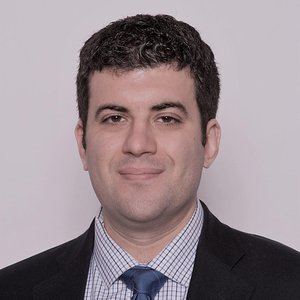Using Data and Analytics to engage with Consumers: An Interview with David Rimshnick and Brent Walker
Conference 2018

Brent Walker

David Rimshnick
The Pulse had a chance to catch up with David Rimshnick and Brent Walker of Pfizer. David and Brent both work in data and analytics roles within Pfizer – David’s team helps establish innovative data science capabilities within the organization and Brent’s team helps enable and scale these new analytic capabilities across Pfizer. Given their roles within one of the largest pharmaceutical companies in the world, David and Brent offered unique perspectives on emerging analytical capabilities and how these capabilities could impact consumers.
Pulse: How has the ongoing trend towards the consumerism of healthcare impacted Pfizer broadly?
Pfizer has always put the needs of the patient and consumer first. The rise of consumerism creates new opportunities to provide patients more and better information to help them optimize decisions impacting their health.
In the past, we primarily engaged with patients through providers and physicians. With the growth in our use of data and analytics, we are building the capabilities to better inform HCP and consumer decisions. In this way, we can be more targeted with our HCPs and consumers and help them receive the right information about the right treatment options at the right time – which can in turn impact patient outcomes in a very positive way.
In addition, we have seen the format of our communications with patients change. Pfizer always had direct touchpoints with consumers through direct-to-consumer advertising on television. These touchpoints have exponentially grown in recent years, enabling us to be more targeted and more effective in our communications not only to consumers, but also to prescribing physicians.
Pulse: Both of your teams sound exciting and cutting edge with your use of data science tools and capabilities – what are some ways that Pfizer has used these new tools to engage with patients?
Our teams approach our work with a patient-first mentality, which has led to many innovations for Pfizer. One example innovation is the use of machine learning and natural language processing to intake and process EHR data with the goal of predicting patients who may be affected by rare diseases, as many of these rare diseases go undiagnosed in the US. By partnering with physicians and healthcare providers, we can help improve the likelihood of getting life-changing medications to these patients – and this simply would not have been possible without our new analytical capabilities.
Another example is using predictive modeling to identify markets that do not align with broader trends – and then Pfizer’s field teams can work to empower physicians and consumers to have informed treatment discussions , with the goal of increasing quality outcomes for our patients.
Lastly, our teams have actively worked to support other groups within Pfizer that interact with our patients. Utilizing our data and analytics capabilities, we can help teams understand the true drivers behind certain patient or physician behavior. These innovative approaches have allowed our teams to better understand our patients’ and physicians’ needs, and better tailor our tools and resources to those needs.
Pulse: It seems like Pfizer has made substantial strides recently in your use of data and analytics – how much of this is due to an increase in the amount and quality of data available?
For us, an increase in the amount of available data has not been a major driving force. Many of the datasets that we currently use are publicly available or have been available by providers for years. The major shift in recent years has been the explosion of tools and processing capabilities in the market – these tools have allowed us to better use the data that we already had. By using these advanced processing capabilities, we have been able to understand trends in the data we have, and we’ve been able to become more effective in our approach to engaging with consumers and to the market more generally.
Pulse: Obviously healthcare is a rapidly changing environment. Where do you see the trend towards consumerism and the use of data and analytics going in the future?
Healthcare is an incredibly complex ecosystem. Within this complex ecosystem, consumers are impacted by a variety of different stakeholders with a variety of different incentives – payers, health care providers, pharmacists, and pharmaceutical companies. Our hope is that data science capabilities will enable us to analyze the complete journey with regards to our patients and to utilize data to support that journey.
Thinking beyond our current capabilities, proficiencies enabled by AI could also aid us to better understand the needs of our patients. Using these new capabilities could help us arm patients with information relevant to their health – ultimately helping to address their needs.
The use of data and analytics is an ever-growing area with substantial opportunity and room for growth. We are excited about utilizing data and these new capabilities to deliver an enhanced experience to our patients. We believe these tools will enable us to help patients and positively impact lives, and ultimately that’s exactly what our teams plan to do.